Forged shafts are essential components in power generation systems, valued for their exceptional strength and reliability. Their ability to perform under extreme conditions far exceeds alternatives, with forged-steel crankshafts offering 36% higher fatigue strength and a service life six times longer than cast products. The open die forging process significantly enhances structural integrity by eliminating internal voids and refining the crystalline structure, ensuring components can endure high stress. This method is crucial for creating durable parts like generator shafts, which require superior mechanical properties. Companies specializing in Custom Forging Services China, such as Rongli Forging Co., Ltd, excel in meeting these demanding standards with precision and expertise.
Key Takeaways
- Forged shafts are very strong and long-lasting, making them key for steady power generation.
- The open die forging method makes shafts tougher to handle harsh conditions.
- Forged shafts lower repair costs because they last longer and resist wear.
- Custom forging helps create shafts that fit different power generation needs.
- High-quality forged shafts improve how well turbines and generators work.
Unique Properties of Forged Shafts
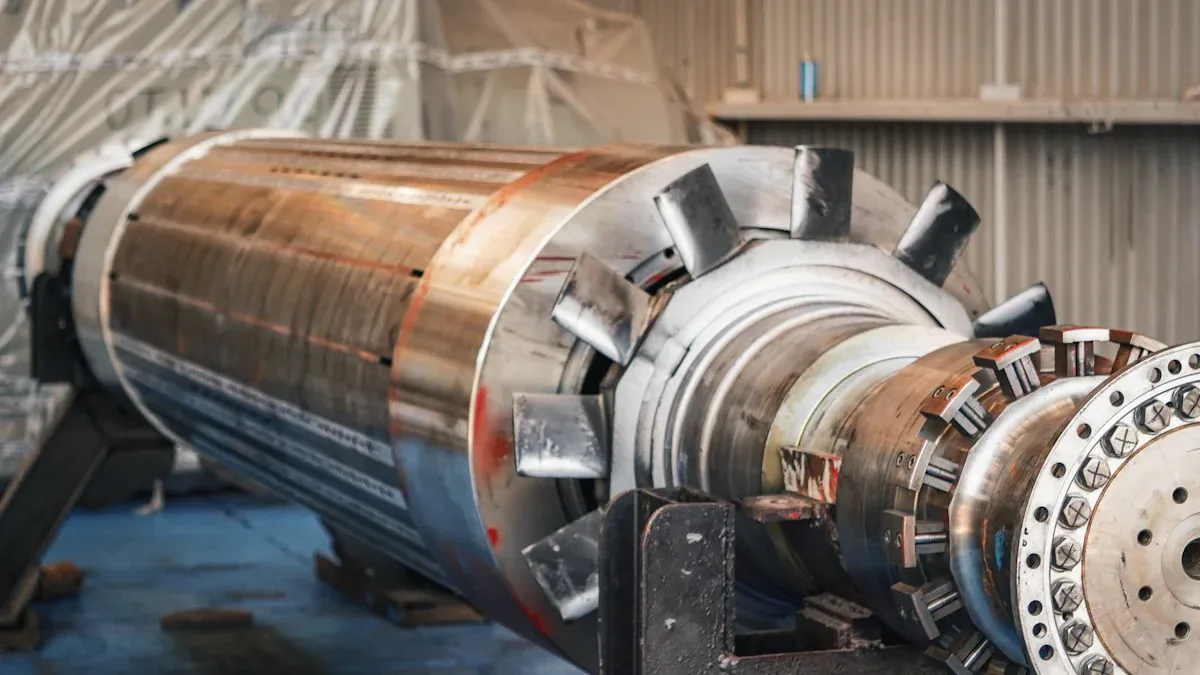
Strength and Durability
Forged shafts exhibit exceptional strength and durability, making them indispensable in power generation systems. The forging process compresses the material, eliminating internal voids and enhancing its mechanical properties. This results in components that can withstand immense loads without deformation. Industries rely on forged shafts for their ability to endure high-pressure environments, ensuring consistent performance over extended periods. The open die forging method further enhances these properties by refining the grain structure, creating a product that is both robust and long-lasting.
Resistance to Stress and Fatigue
Power generation systems operate under extreme conditions, subjecting components to continuous stress and fatigue. Forged shafts excel in these environments due to their superior resistance to cracking and wear. The forging process aligns the material’s grain flow with the shaft’s shape, improving its ability to handle cyclic loads. This alignment minimizes the risk of failure, even under prolonged use. Companies offering Custom Forging Services china, such as Rongli Forging Co., Ltd, specialize in producing shafts tailored to meet these demanding requirements. Their expertise ensures that each component delivers optimal performance in critical applications.
Structural Integrity and Homogeneity
Structural integrity is a defining feature of forged shafts. The open die forging process eliminates impurities and ensures uniformity throughout the material. This homogeneity enhances the shaft’s ability to distribute stress evenly, reducing the likelihood of weak points. The result is a component with consistent quality and reliability, capable of meeting the rigorous demands of power generation. Manufacturers like Rongli Forging Co., Ltd adhere to stringent quality standards, ensuring that each shaft meets precise specifications for strength and performance.
The Open Die Forging Process
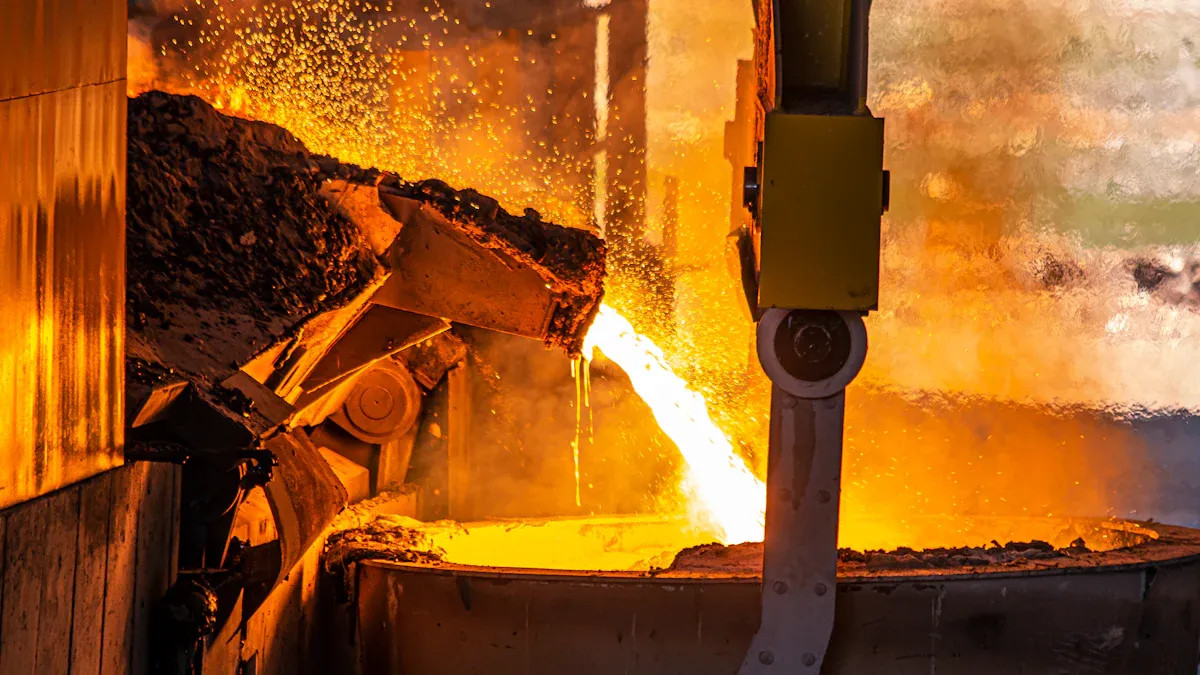
How Open Die Forging Works
Open die forging is a versatile process used to shape large metal components like shafts, sleeves, and disks. Unlike closed die forging, this method does not completely confine the workpiece within the dies. Instead, the material is manipulated repeatedly under a hydraulic press or hammer to achieve the desired shape. Operations such as drawing out, upsetting, and piercing are commonly employed, often in combination with forging over a mandrel.
The process involves reheating the workpiece multiple times to maintain its malleability. A general rule of thumb states that 50 pounds of falling weight is required for each square inch of the stock’s cross-section. This technique is particularly effective for producing components weighing between 5 and 500,000 pounds, making it ideal for power generation applications. Companies offering Custom Forging Services china, such as Rongli Forging Co., Ltd, excel in utilizing this process to create high-quality forged shafts tailored to industry needs.
Advantages of Open Die Forging Over Other Methods
Open die forging offers several advantages over alternative manufacturing methods. The process enhances the internal structure of the metal, resulting in improved mechanical properties. Key benefits include:
- Improved Grain Flow: The forging process refines the metal’s grain structure, enhancing strength and durability.
- Reduced Porosity: Open die forging minimizes internal voids, creating a denser and more reliable material.
- Increased Strength and Durability: The refined internal structure ensures the component can withstand extreme conditions.
| Mechanism | Description |
|---|---|
| Improved Grain Flow | The process refines the internal structure of the metal, leading to better mechanical properties. |
| Reduced Porosity | Open die forging minimizes defects, resulting in a denser material with fewer voids. |
| Increased Strength and Durability | Enhanced internal structure contributes to overall strength and longevity of the forged shafts. |
These advantages make open die forging the preferred choice for critical applications in power generation systems.
Quality Control in Open Die Forging
Quality control plays a vital role in ensuring the reliability of forged components. Manufacturers implement rigorous inspection protocols to meet industry standards. Key quality control metrics include:
| Quality Control Metric/Procedure | Description |
|---|---|
| Continuous Process Monitoring | Ongoing monitoring of quality objectives and internal audits to ensure conformity. |
| Incoming Verification | Verification of materials from suppliers for conformance to requirements. |
| First Article Inspection | Inspection during the first run of a new product or significant changes. |
| Last Article Inspection | Final inspection of forging runs to ensure quality before delivery. |
| Random and Planned Sampling | Monitoring of samples to ensure key characteristics are met. |
These measures ensure that each forged shaft meets precise specifications for strength, durability, and performance. Rongli Forging Co., Ltd adheres to these stringent standards, delivering reliable products for power generation and other industries.
Applications of Forged Shafts in Power Generation
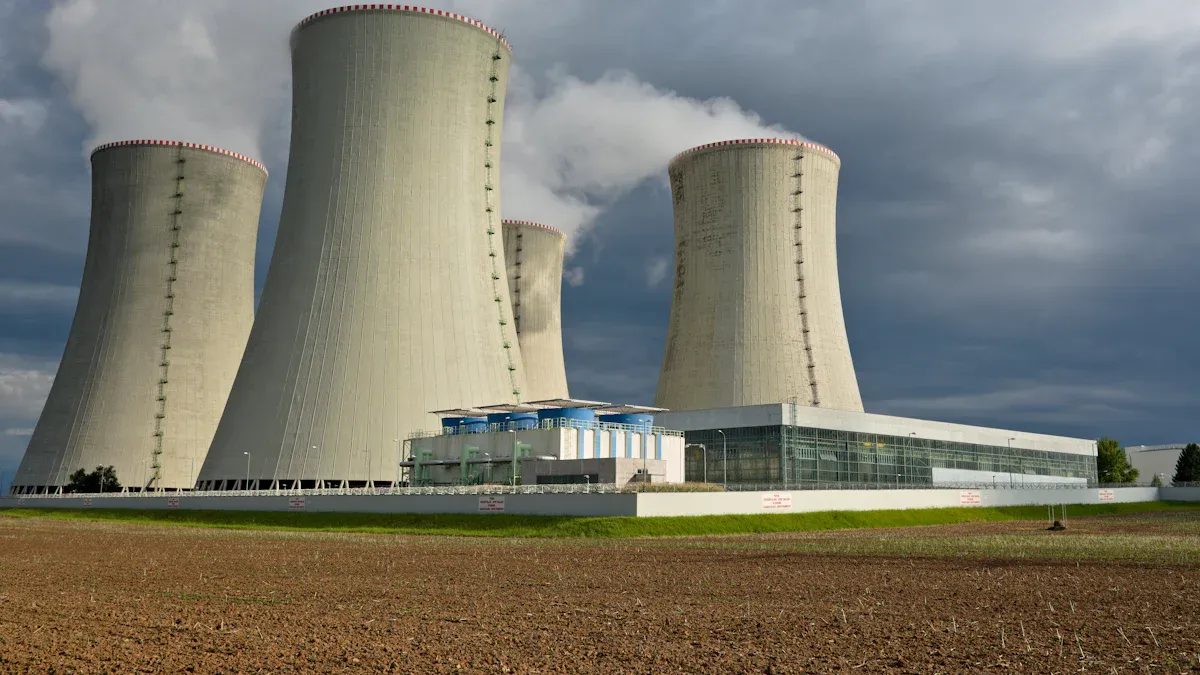
Role in Turbines
Forged shafts play a critical role in turbines, which are essential for converting energy into mechanical power. These shafts must endure high rotational speeds and extreme temperatures while maintaining structural integrity. The open die forging process ensures that turbine shafts possess the necessary strength and durability to handle these demanding conditions. Manufacturers like Rongli Forging Co., Ltd produce custom turbine shafts that meet stringent industry standards, ensuring reliable performance in both wind and thermal power applications. Their ability to withstand stress and fatigue makes them indispensable in modern power generation systems.
Use in Generators
Generators rely on forged shafts to transfer mechanical energy into electrical power efficiently. These components must operate under high pressure and rotational forces, often in harsh environments. Forged generator shafts, such as those produced by Rongli Forging Co., Ltd, are precision-engineered to meet the specific requirements of power plants. The open die forging process enhances their mechanical properties, ensuring consistent performance and longevity. This reliability reduces downtime and maintenance costs, making forged shafts a cost-effective solution for power generation facilities worldwide.
Applications in Other Critical Machinery
Beyond turbines and generators, forged shafts find applications in various critical machinery used in power generation. Industries such as wind, hydro, and biomass energy benefit from the unique properties of forged components. The table below highlights some key applications and their advantages:
| Application Type | Components Used | Benefits |
|---|---|---|
| Wind Energy | Turbines, Shafts | High durability under extreme conditions |
| Hydro Energy | Generators, Shafts | Performance in high-pressure environments |
| Biomass Energy | Kiln components, Reactors | Ideal for high heat and caustic environments |
| Solar Energy | Heat exchangers, Blowers | Precision-crafted for renewable energy structures |
In addition, forged shafts are vital in industries like aerospace, automotive, and heavy machinery. These sectors demand components with high fatigue resistance, lightweight properties, and precision engineering. Companies offering Custom Forging Services china, such as Rongli Forging Co., Ltd, excel in meeting these diverse requirements. Their expertise ensures that forged shafts deliver optimal performance across various applications.
Economic and Operational Benefits
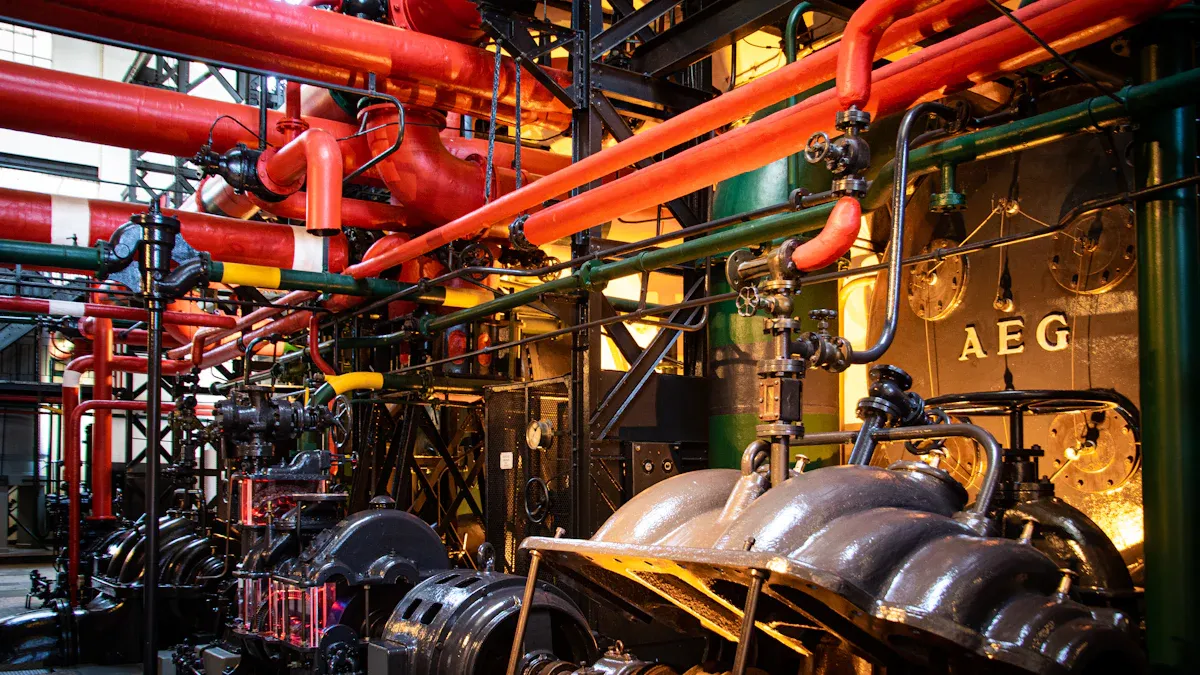
Reduced Maintenance Costs
Forged shafts significantly reduce maintenance costs in power generation systems. Their superior mechanical properties, such as enhanced fatigue resistance and slower crack growth rates, ensure longer service life and fewer failures. A comparison of forged steel crankshafts and cast iron crankshafts highlights these advantages:
| Metric | Forged Steel Crankshafts | Cast Iron Crankshafts |
|---|---|---|
| Fatigue Strength Increase | 36% | N/A |
| Expected Service Life | 6 times longer | N/A |
| Crack Growth Rate | Slower | N/A |
| Fatigue Resistance Increase | 36% | N/A |
| Life Expectancy Increase | 30 times longer | N/A |
These attributes translate to fewer breakdowns and reduced downtime, making forged shafts a cost-effective solution for power plants. Companies offering Custom Forging Services china, such as Rongli Forging Co., Ltd, provide tailored solutions that meet the specific needs of power generation facilities, ensuring optimal performance and durability.
Improved Efficiency and Performance
Forged shafts enhance the efficiency and performance of power generation systems. Their refined internal grain structure improves strength and durability, enabling them to withstand high-stress applications. Key benefits include:
- Improved Efficiency: Tighter tolerances and smoother surface finishes reduce friction, minimizing energy loss.
- High Reliability: Excellent fatigue resistance ensures consistent performance over time.
- Noise and Vibration Reduction: Precision engineering reduces operational noise and vibrations, enhancing system stability.
These features make forged shafts indispensable in critical machinery like turbines and generators. By leveraging advanced manufacturing techniques, companies like Rongli Forging Co., Ltd deliver high-quality components that optimize operational efficiency.
Longevity and Reliability in Harsh Environments
Forged shafts excel in harsh environments due to their exceptional durability and reliability. Studies show that forged steel crankshafts possess 36% higher fatigue strength than cast iron alternatives, resulting in a service life six times longer. This durability stems from their improved internal grain structure, which enhances wear resistance and impact toughness.
Additional advantages include:
- Resistance to wear and tear, crucial for high-intensity applications.
- Superior fatigue resistance, ensuring long-term reliability under repeated stress cycles.
- Customization options, allowing for tailored solutions that meet specific environmental challenges.
These qualities make forged shafts ideal for power generation systems operating in extreme conditions, such as biomass and hydroelectric plants. Manufacturers like Rongli Forging Co., Ltd adhere to stringent quality standards, ensuring their products deliver sustained performance and reliability.
Custom Forging Services china
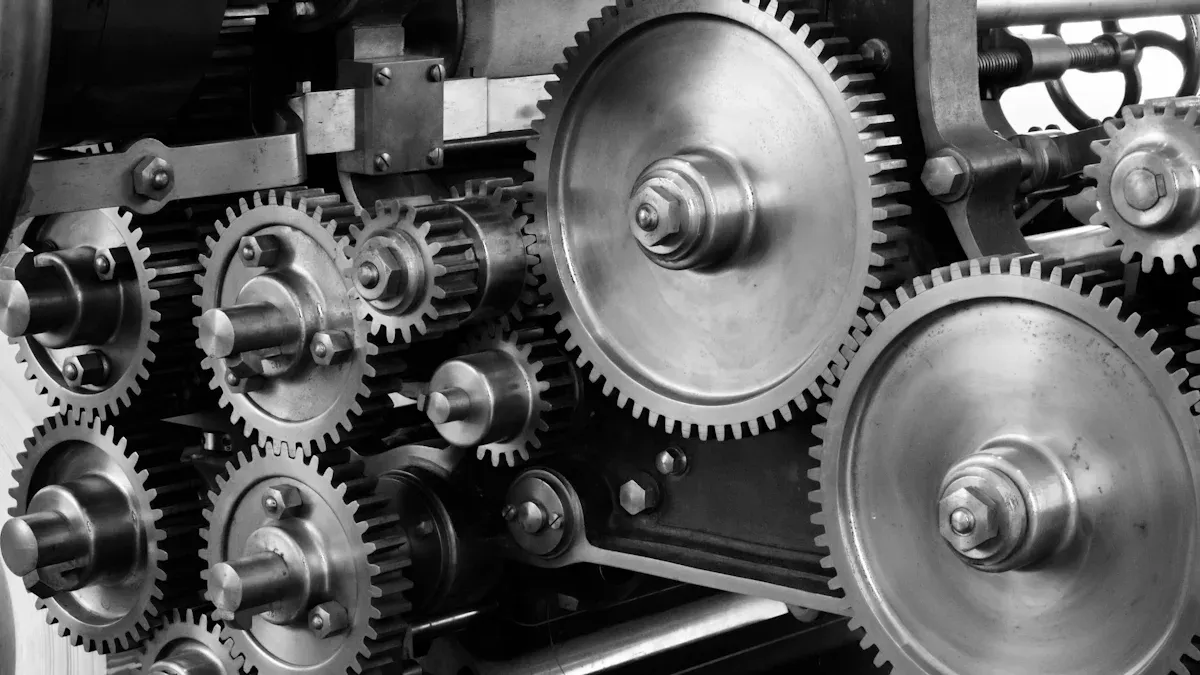
Expertise of Rongli Forging Co., Ltd
Rongli Forging Co., Ltd stands as a leader in the forging industry, offering unmatched expertise and advanced manufacturing capabilities. The company operates a state-of-the-art facility equipped with a 7000-ton hydraulic forging press and large lathes capable of producing parts up to 12 meters in length and 2.5 meters in diameter. This infrastructure enables the production of high-quality forged components tailored to meet the rigorous demands of power generation systems.
The company’s certifications and production capabilities further highlight its leadership in the industry:
| Certification/Standard | Details |
|---|---|
| ISO9001-2008 | Quality Assurance |
| Production Weight | Up to 70 Tons of finished forging, 90 Tons for ingot |
| Inspection Methods | Chemical analysis, Tensile test, Charpy test, Hardness Test, Metallurgy test, Ultrasonic test, Magnetic Particle test, Liquid Penetration test, Hydro test, Radiographic test |
These credentials demonstrate Rongli’s commitment to delivering reliable and high-performing forged components for critical applications.
Tailored Solutions for Power Generation
Rongli Forging Co., Ltd specializes in providing custom solutions that address the unique challenges of power generation. The company’s tailored forging services ensure that each component meets specific operational requirements, enhancing efficiency and reliability.
- Parts are produced as single forged pieces, eliminating the need for welding and ensuring consistent quality.
- Forged materials meet demanding application requirements, offering superior structural integrity.
- Tailored solutions are utilized in renewable energy sectors, including solar, geothermal, wind, hydro, and biomass.
- Precision-crafted components withstand harsh environments, ensuring long-term performance.
- The forging process improves material properties, reduces waste, and enhances structural integrity compared to traditional manufacturing methods.
These solutions make Rongli a trusted partner for power generation facilities worldwide.
Quality Assurance and International Standards
Rongli Forging Co., Ltd adheres to stringent quality assurance practices, ensuring that every product meets international standards. The company’s certifications and audit results validate its commitment to excellence:
| Standard | Certification Year | Audit Process Description |
|---|---|---|
| ISO 9001:2008 | 2008 | Independent audits by a quality systems registrar to ensure compliance with standards. |
| AS9100:2009 | 2009 | Audits conducted to verify adherence to aerospace quality management requirements. |
| Standard | Certification Year | Additional Accreditation Description |
|---|---|---|
| ISO 9001:2015 | 2015 | Certification for quality management systems ensuring customer satisfaction. |
| AS9100D | 2016 | Aerospace standard ensuring quality in design and manufacturing processes. |
| NADCAP | N/A | Accreditation for specific processes like Heat Treatment and Nondestructive Testing. |
These certifications reflect Rongli’s dedication to maintaining the highest standards in forging, ensuring that its products consistently deliver exceptional performance in power generation systems.
Forged shafts, especially those crafted through open die forging, remain indispensable in power generation systems. Their unmatched strength and durability ensure reliable performance under extreme conditions.
- Open die forging supports the production of large, high-strength components, making it ideal for turbines and generators.
- The process enhances mechanical properties, ensuring components meet the rigorous demands of power generation.
- The growing demand for customized solutions in renewable energy underscores the importance of tailored shaft designs for optimal efficiency.
Investing in high-quality forged shafts guarantees long-term operational success, reduced maintenance costs, and enhanced system reliability.
FAQ
What makes forged shafts superior to other manufacturing methods?
Forged shafts offer unmatched strength, durability, and resistance to stress. The open die forging process refines the grain structure, eliminates voids, and enhances mechanical properties. These features make them ideal for critical applications in power generation systems.
How does open die forging improve the quality of forged shafts?
Open die forging aligns the grain flow with the shaft’s shape, enhancing strength and fatigue resistance. This process also reduces porosity and ensures uniformity, resulting in components with superior structural integrity and reliability.
Why are forged shafts essential in power generation systems?
Forged shafts withstand extreme conditions, including high pressure and temperature. Their durability and resistance to fatigue ensure consistent performance in turbines, generators, and other critical machinery, reducing downtime and maintenance costs.
Can forged shafts be customized for specific applications?
Yes, manufacturers like Rongli Forging Co., Ltd provide tailored solutions. They produce forged shafts in various sizes, materials, and specifications to meet the unique requirements of industries such as thermal power, hydro, and renewable energy.
What quality standards do forged shafts adhere to?
Reputable manufacturers follow international standards like ISO 9001:2008. They conduct rigorous inspections, including ultrasonic and tensile tests, to ensure each forged shaft meets precise specifications for strength, durability, and performance.
Post time: Mar-14-2025



